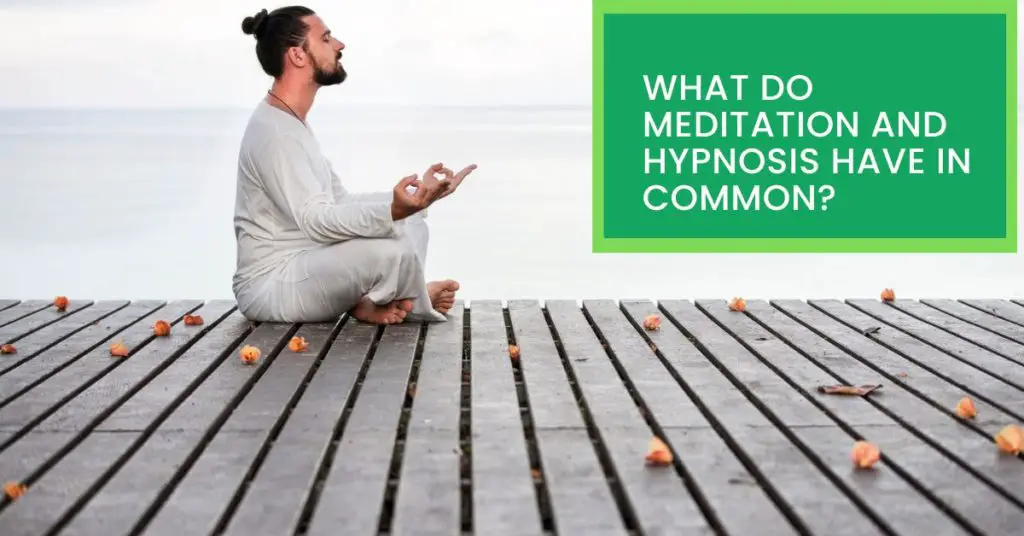Meditation is a practice where an individual uses a technique – such as mindfulness or focusing their mind on a particular object, thought, or activity – to train attention and awareness and achieve a mentally clear and emotionally calm state.
Hypnosis is an altered state of consciousness in which the person is more receptive to suggestions. In this state, the person’s critical faculties are relaxed and more open to suggestions.
Both meditation and hypnosis can be used to help people relax, reduce stress and anxiety, and improve their mood. They can also be used to help people with chronic pain, sleep disorders, and other health conditions.
This article will explore the similarities and differences between meditation and hypnosis. We will also look at the benefits of each practice and how they can be used to improve your health and well-being.
What is Meditation?
Meditation is an ancient practice that has been used for centuries to promote peace and well-being.
Meditation involves sitting quietly and focusing on your breath. As you focus on your breath, you let go of thoughts and worries that may be causing stress or anxiety.
Meditation can help you learn to control your thoughts and emotions, and it can also help you become more aware of the present moment. Meditation is a simple and effective way to reduce stress, and it can be done anywhere, at any time.
There are many different types of meditation, but all of them involve focusing your attention on something (such as your breath) and letting go of thoughts that are causing stress or anxiety. If you’re new to meditation, there are many resources available to help you get started.
What is Hypnosis?
Hypnosis is a natural state of mind that we all experience every day.
It’s a state of focus, concentration and relaxation. When you are in a state of hypnosis, your mind is more open to suggestions and change.
Hypnosis is often used for therapeutic purposes, to help people overcome issues such as anxiety, stress, pain, phobias, and bad habits.
During hypnosis, you are in a state of heightened suggestibility, and your mind is more open to change. This means you can learn new things more easily, create new habits, and break old ones.
How Are Meditation And Hypnosis Similar?
Meditation and hypnosis are both relaxation techniques that can be used to improve mental and physical well-being. Both practices involve focusing the mind on a certain object or thought, and both can lead to a state of deep relaxation.
While meditation is a practice that anyone can do, hypnosis usually requires the help of a trained professional. During hypnosis, the professional will guide the person into a state of relaxation and help them focus their thoughts.
Both meditation and hypnosis can be used to help people deal with stress, anxiety, and pain. They can also be used to improve sleep quality, concentration, and overall mental health.
Overall, these are just a few of the ways that meditation and hypnosis are similar. If you’re looking for a way to relax and improve your well-being, then consider trying one (or both!) of these practices.
How Are Meditation And Hypnosis Different?
Meditation and hypnosis are both popular methods for relaxation, stress relief, and improving focus. But what are the key differences between these two approaches?
Here are some key ways that meditation and hypnosis differ:
1. Meditation is a passive practice, while hypnosis is an active one.
2. Meditation is self-directed, while hypnosis is guided by another person.
3. Meditation typically doesn’t involve specific goals or targets, while hypnosis often does.
4. Meditation is a completely internal process, while hypnosis usually involves some external cues (such as a hypnotist’s voice).
5. Meditation can be done anywhere, anytime, while hypnosis usually requires a quiet and relaxed setting.
So, which approach is right for you? Ultimately, it depends on your individual needs and preferences. If you’re looking for a more passive and internal relaxation practice, meditation may be a good choice. If you’re seeking relief from stress or anxiety or looking to achieve specific goals, hypnosis may be a better fit.
Meditation Vs. Hypnosis: Which One is Better For You?
The answer to this question is not as simple as you might think. It all depends on what you are hoping to achieve with either method.
If you are looking for a way to relax and de-stress, then meditation is probably the better option for you. However, if you are looking for a way to change your behaviour or thought patterns, then hypnosis might be a better option.
Both meditation and hypnosis can be effective methods for achieving different things. It really just depends on what you are hoping to achieve and which method you feel more comfortable with.
Frequently Asked Questions Related to Meditation And Hypnosis
1. Is mindfulness the same as hypnosis?
Mindfulness and hypnosis are different. Mindfulness changes how you see experiences, while hypnosis alters the experience itself.
For example, if you’re mindful of an anxiety attack, you’ll experience it as a series of thoughts and sensations, but you won’t be overwhelmed by them. With hypnosis, on the other hand, you might be able to reduce or eliminate the attack altogether.
2. Who shouldn’t hypnosis?
Not everyone is suitable for hypnosis. If you have psychosis or a certain type of personality disorder, then hypnosis may not be the right treatment for you. Always consult with a licensed therapist before starting any new treatment.
3. What is a hypnosis meditation?
A hypnosis meditation is a type of meditation in which you focus your attention on a particular word, sound, or object.
This focus helps to clear your mind of distractions and allows you to more easily enter into a state of deep relaxation. In this relaxed state, your mind is more open to suggestions, and you can more easily explore the unconscious mind.





